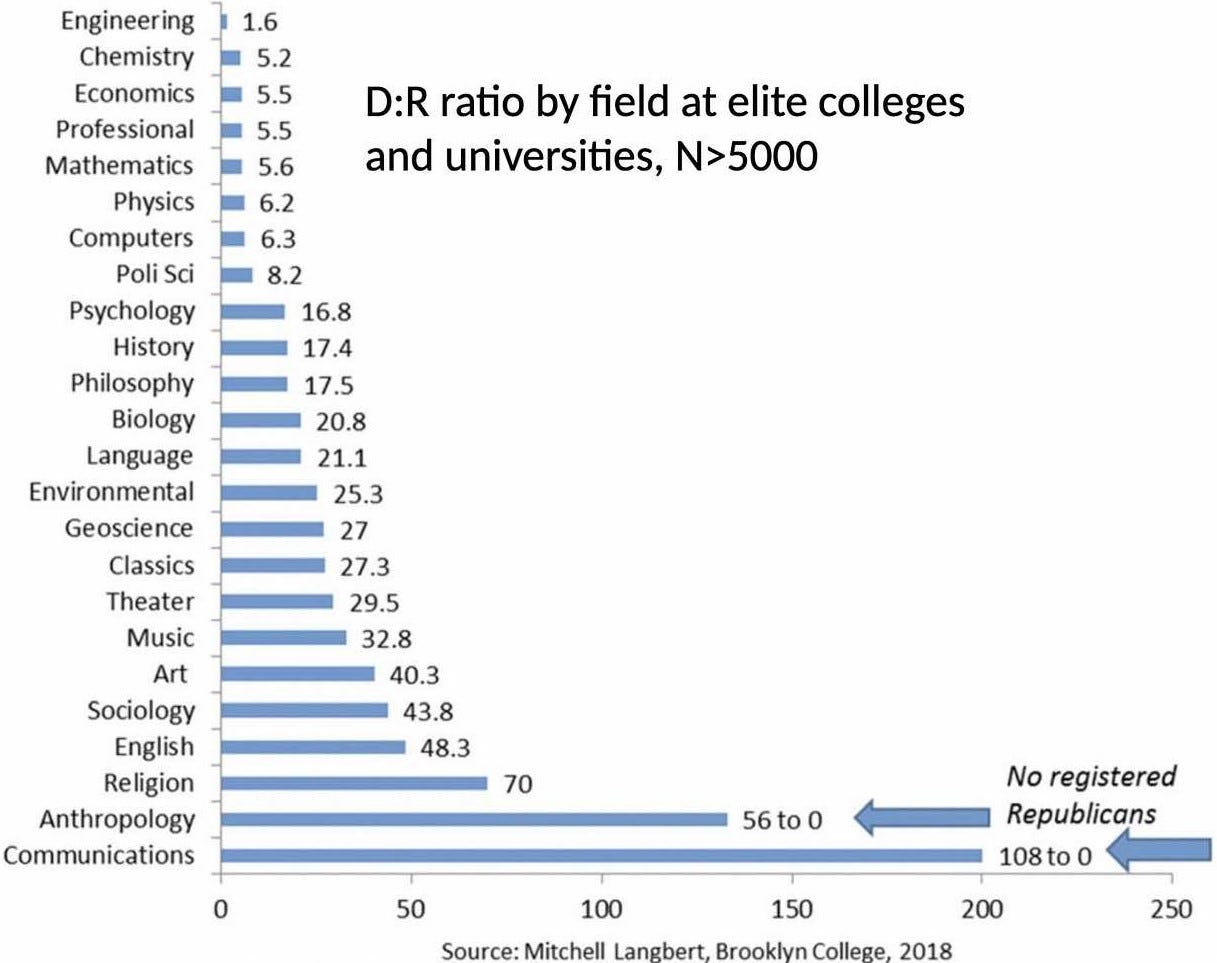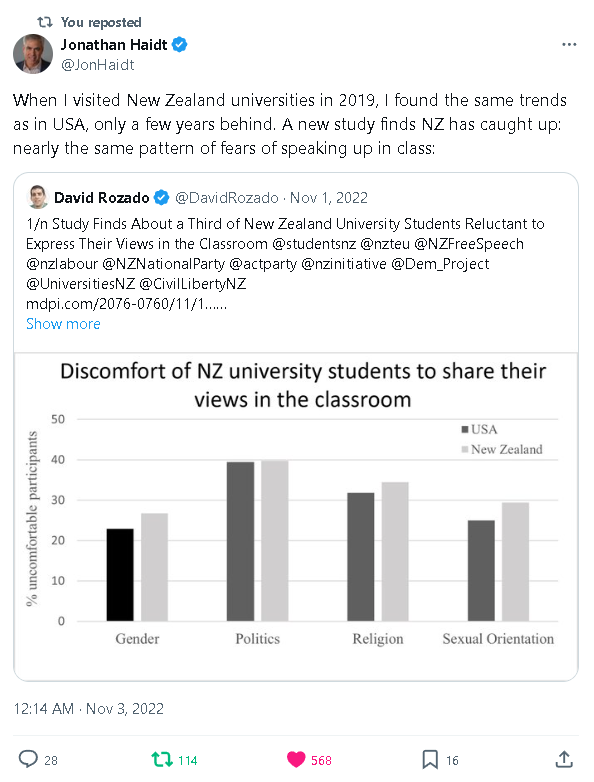The End of the Western Liberal Nation State
Universities are overwhelmingly Left-wing and what it might mean for the future
My University is Overwhelmingly Left-wing
A couple of years ago, I was giving a presentation at my University. Offhandedly, I mentioned that New Zealand Universities would likely follow the political demographics of tertiary institutions in the United States and United Kingdom, and be overwhelming left-wing.
I had this graph in mind, that compared the ratio of Democrats to Republicans in specific academic fields:
I was challenged immediately by fellow students.
“No, actually, Universities are right-wing.”
“What, here or … ?”
“Like, everywhere. …”
I was stunned, and tried to describe to them what I remember in the graph, other statistics I had seen, and of course, when all of that failed, my own experience.
By the time I returned to University at 28, my views had begun a somewhat stereotypical shift.
As a young idealist in my late teens, I prayed to the religions of science and philosophy to alleviate the suffering of the poor, of those families torn apart by modern war. I thought this may best be achieved by giving to global charities, and instituting the economic system of socialism. I didn’t understand that charities can be inefficient and corrupt, and I didn’t know that socialism meant central planning.
I left my first stint at University with a double-major in Philosophy and Art History, and travelled the world as a ski instructor. Although I would never describe teaching people the sport I love in some of the most beautiful places in the world as hard-work, I had departed the University bubble. I begun to experience life outside the theoretical, the ideal.
The way I had heard foreigners be described at University did not align with what I saw. I made friends with Asian Christians who believed God was not in fact evil, as Christopher Hitchens had famously argued. I drank Vodka with Eastern-Europeans who had lived under the iron curtain and thought socialism was the stupidest idea imaginable. Later on, I became close with a Muslim who’s family lived in such remoteness, ‘an eye for an eye’ was their only system of policing. Hearing another man, clearly moral, responsible, and honourable, defend this ‘barbarism’, was life-changing.
Though I rarely accept anything as truth without further examination and reflection, I now understood that how academics and students viewed the world was only one way of viewing the world. In many ways it might be superior. But in many ways it might not be.
Upon my return to University, my issue was that they never suggested the latter. They assumed the former, and marched on. Some argue there were plenty inside the University that had dissenting views, that despite the wave of leftism, tried to stay impartial, and allowed students to ‘hear both sides’. But, in my experience and many other students experience that over the last four years I have connected with because of our shared disillusionment, these academics were incredibly rare. There was no room for a conservative opinion. For arguing for Trump. For suggesting the vaccine mandates were tyrannical.
Fortunately, I am supervised by one of these rare academics. Without him, I probably would have left by now. He defends my right to speak, while disagreeing with me about many things. A few years ago, he, along with academics around the country, assessed the degree to which students believe they can share their opinion on topics at Universities in New Zealand. The results were startling:
… overall, 65.4% [of students] were reluctant to speak on at least one of the topics surveyed, significantly greater than the corresponding proportion (i.e., for the same four topics) in the American sample (56.6%).
New Zealanders, like the Americans, were most reluctant to discuss politics, then religion, sexual orientation, and finally gender.
Importantly, right-leaning New Zealanders, like Americans, were more reluctant to share their views when compared to their left-leaning counterparts, especially about gender and sexuality.
There could have been several reasons for this, though the obvious one is that the Universities are overwhelmingly left-wing: Only 6.6% of students identified as right-wing.
6.6%!
Here was some evidence that vindicated my experience.
I’ll go into more detail in a later post, but my first objective in my PhD was to build upon this study, by specifying what topics, rather than general categories (like ‘Politics’ or ‘Religion’), people may be afraid to discuss. I have recently got the results back, and while I have barely 80 student participants, and barely 100 staff participants, they are fairly representative of my University according to the department they study or work in.
When asked their political views, 48.1% of staff stated they have “Mostly Left-wing Views”, 29.2%, “Mostly Centrist Views”, and 1.9%, “Mostly Right-wing Views”. For students, 57% stated they have “Mostly Left-wing Views”, 16.3%, “Mostly Centrist Views”, and 4.7%, “Mostly Right-wing Views”.
When asked what political party best represented their views, 32.4% of staff said the “Greens” did, 21.9 % “Labour”, 4.8% “National”, 4.8% “Te Pāti Māori”, 3.8% “Act”, and 2.9% “NZ First”. For students, 45.7% said the “Greens” did, 8.6 % “Labour”, 3.7% “National”, 2.5% “Te Pāti Māori”, 2.5% “NZ First”, and 1.2% “Act.”
For those readers who don’t know, here’s our political party spectrum, from left-to-right, roughly: Greens, Te Pāti Māori, Labour // National, NZ First, Act.1 Both student and staff views are dominated by a political party that is on the farthest left of our political system. By contrast, the right leaning parties, all of them, barely get a look in.2
Can a University maintain its impartiality and dedication to discovering the truth, if its student and staff populations mostly believe one ideology?
To varying degrees staff have power over what is learnt, and how it is learnt (students have a growing influence, too). They choose and construct papers, which constitute degrees. If the majority of these staff are left-wing and almost none of them right-wing, what do you think is presented to the individual student? Do you really believe academic staff are unlike other humans, impartial, rational, non-emotional, and are not subject to basic tribal and social forces that politics gruffly grabs a hold of?
Do you really think that what is presented to the student, on average, is not biased?
Some individual academics may be able to dissociate bias from belief, considering a wide range of viewpoints, but many if not most do not. Certainly, some do this unintentionally, but many - as I have directly experienced - intend to show only one side of an argument. They do not want students considering counter-narrative, what-ifs, nuance. And I suspect a growing proportion are now eliminating arguments that may excite a complaint against them by students, out of fear of cancellation.
I have no issue with left-wing academics and students protecting their own, advocating for their own group, believing their way is best. This is human nature. The issue is that University, a supposed ‘public good’, is in part paid for by the taxpayer, and that these same taxpayers have a far more diverse range of beliefs. They rightly expect that their children, who will go into student debt, which is even more of a burden in today’s economic stagnation, should not be subject to a biased education.
The word University comes from the Latin word universitas, meaning "a whole" or "a totality."
Today, it is anything but.
If Universities do not attempt to alter their bias, then one of the bastions of social unity, where individuals and their beliefs mix to establish a cultural narrative and ideal, is lost. If Universities are no longer for all people, for all citizens, conservatives too, then the dissolution of the Western Liberal Nation State appears terminal.
In the future, we may have distinct Progressive/Liberal Universities and Conservative/Traditional Universities, funded privately and offering degrees for corporations and organisations that themselves are either Progressive or Conservative. The ‘siloing’ of intellectual thought and belief, exasperated by social media and the battle between mainstream and alternative media, will be reflected on the soil of Western countries in a radical way. The seeming next step then, would be the establishment of separate nations, and the increasingly antagonistic relationship between Progressive and Conservative would finally be over.
I suspect many people on both sides would welcome this outcome.3
Yet, there are still some within and without these tertiary institutions that are fighting back. … Or, say they are fighting back.
As I was writing this, I was shared a 60 minutes investigation on CBS into the University of Austin Texas, a new tertiary institution that is anti-Diversity Equity and Inclusion, pro-free speech, and claiming ideological neutrality. A project I had been following for some time, those on the left may dismiss this as an example of what I just described - the establishment of a conservative University, especially as it is privately funded.
Of course, the left often does this to anyone or anything that is not ideologically pure. Any deviation is considered conservative. In the coming years, we will see whether this new institution swerves right, whether this is an innovative step in the regenerating - or dissolution - of our culture.
Frankly, at this point, I don’t know which direction I would prefer. Does our our culture need to split, to dissolve into separate parts? Does the increasingly toxic marriage need to end? Or do we just need a marriage counsellor?
Let me know in the comments.
Thank you all for reading!
If you enjoyed this, please consider giving it a like, or if you have some thoughts, share them in the comments.
Even better, click this button…
If you want to support me further, and help me realise my dream of becoming an independent writer and voice, you can upgrade to a paid subscription or you can simply give me a tip.
Chur, and have a good day and night,
The Delinquent Academic
One could argue Te Pāti Māori is to the left of the Greens. In many ways I would agree, however given their party advocates solely for the rights of a single ethnicity, Māori, and in past have explicitly stated the superiority of this ethnicity, which is typical of a far-right party, I have put them to the right of Greens.
The centrist who never votes right wing: I’m not sure if this is an official socio-political phenomenon but in these demographics is an example of the how many centrists, when push comes to shove, vote left-wing rather than right. The proportion of staff who said they have ‘Mostly Left-wing Views was 48.1%, but on the voting stand, this number grew to 59.1% - suggesting that many of the so-called centrists, lean left.
Personally, I am undecided as to whether this would be better or worse. A part of me believes our civilisation needs to dissolve into smaller parts, smaller locales, to live in a simpler, more ‘natural’ and even tribalistic manner.










Yes, it's interesting that a many (most?) of these 'centrists' in your sample caucus with the left, since the usual refrain from the terminally online contingent is that a centrist is just a conservative in sheep's clothing, and even (when they are among comrades) that when forced to choose between communism and fascism, a centrist will side with the fascists to protect their property. But this might be a peculiarity to the bubble of academia, where people are implicitly or explicitly aware that the distribution of political thought skews heavily to one side in a non-normally distributed fashion. Thus the mid point (or centrist zone) of the curve is likely to be further left than the mid point of the wider New Zealand population. Perhaps at university, a centrist really is just a 'vote red until I'm dead'. Of course that perception might also be influenced by not meeting the shy conservative at the institution who is not comfortable wearing their political leanings on their sleeve, but your data suggests otherwise.
I'd be interested to know though, the way the question was framed as to what political parties they would support, was it 'typically I would vote for x', was there a carve out for 'I could see myself voting for Y'? How was your questions for political party support capturing their voting habits?
As someone who embraces Ayn Rand's philosophy that she called Objectivism, I do see a schism developing in the world. There are actually several schisms. One religion vs. another. Those who want to control others due to their self-view of being elites. Those who want us to be free in some ways and controlled in others. No one just wanting to let us live our lives our way.